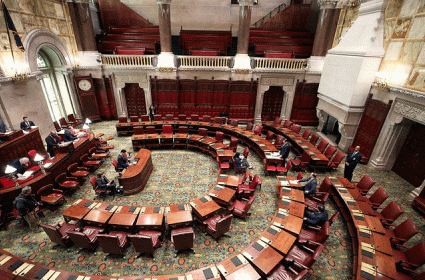Important For Legislatures To Meet During Crisis

By Anoop Ramakrishnan and N.R. Akhil
The near-total shutdown of legislatures in the country, due to COVID-19, has heavily impacted their primary responsibilities of passing laws, approving government expenditure, and supervising government action.
Impact of COVID-19
Due to the threat of COVID-19, both Parliament and state legislatures have curtailed their budget sessions. States like Madhya Pradesh and Andhra Pradesh cancelled their scheduled sessions and have instead issued ordinances for budgetary spending. Meanwhile, central and state governments have responded to the COVID-19 crisis by issuing over 4500 notifications.
Why do legislatures need to meet?
The Constitution empowers legislatures to make laws. The executive gets to implement laws by means of policies, executive orders, and ordinances. While policies and executive orders do not need legislative approval, except for related expenditures, ordinances have limited validity without legislative consent. Ordinances are issued by the President or Governor only when the legislatures are not in session.
Further, legislatures are also empowered to oversee all actions of the government and hold the latter accountable for its actions and inactions. However, they don’t meet often, particularly, state legislatures. They meet for an average of 26 days a year, spending most of those days on the budget session. Consequently, legislations and budgetary proposals are often passed, as soon as they are introduced, without much deliberation. While Parliamentary sittings have also declined in number, that is compensated by the presence of an active standing committee system that scrutinises ministry actions and legislations. Such a committee system is either absent or inactive in state legislatures.
Thus, with governments issuing multiple orders and ordinances to tackle COVID-19, it is vital for legislatures to meet to deliberate and scrutinise these response measures and their potential consequences.
How will legislatures meet?
The COVID-19 pandemic has stayed the standard practice of conducting legislative business physically in designated chambers. Thus, across the world, three different practices of legislatures have been observed: (i) physical meetings with distancing measures, (ii) virtual meetings, and (iii) no meetings at all.
India currently falls in the third category, with only Meghalaya assembly meeting (as usual without restrictions) on May 20. Interestingly, Parliamentary and assembly rules do not impose any physical or geographical restrictions on conducting sessions. The only requirement is that sittings have to be presided over by the Chairman/Speaker or an authorised MP/MLA. The Chairman/Speaker also has wide discretionary powers to decide on matters pertaining to running the House.
While this situation is not unique to India, most legislatures around the world have now had to adapt the way they function. They have adopted measures, such as, (i) social distancing, in France and Spain, (ii) mandatory wearing of masks, in Italy, (iii) plexiglass enclosures, in Greece, and (iv) online meetings, in Maldives and Estonia, with real-time debates, committee meetings and even vote casting.
The Indian Parliament has historically embraced technology, such as, teleprinters, computers, and live telecasts of proceedings. A precedent has also been set by the joint committee of the Parliament on salary and allowances, in April, when they met online to recommend a 30 % salary cut for MPs. Despite this, the Lok Sabha and Rajya Sabha secretariats are currently evaluating the feasibility of holding virtual meetings of standing committees. However, with most legislatures slated to meet next only after July, there is no time like the present for legislatures to go online. It is imperative that government oversight by the legislature continues unhindered even in times of crisis.
Anoop Ramakrishnan and N.R. Akhil are Programme Officers at PRS Legislative Research, a New Delhi-based research organization.





















